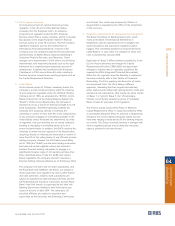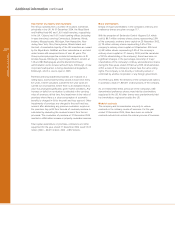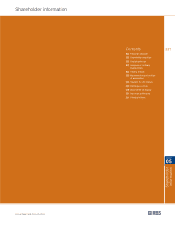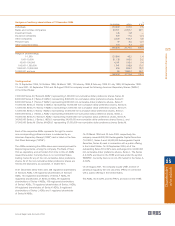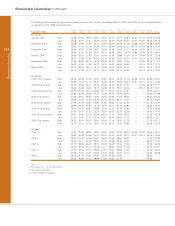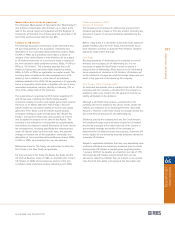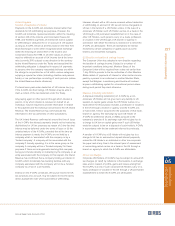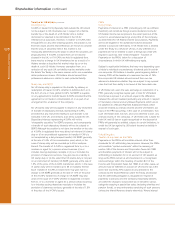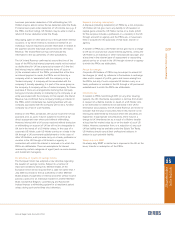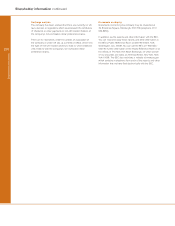RBS 2004 Annual Report Download - page 230
Download and view the complete annual report
Please find page 230 of the 2004 RBS annual report below. You can navigate through the pages in the report by either clicking on the pages listed below, or by using the keyword search tool below to find specific information within the annual report.
228
Shareholder information
Taxation for US Holders (continued)
Inheritance tax
X-CAPs in bearer form physically held outside the UK should
not be subject to UK inheritance tax in respect of a lifetime
transfer by, or the death of, a US Holder who is neither
domiciled nor deemed to be domiciled in the UK for
inheritance tax purposes. However, in relation to X-CAPs held
through DTC (or any other clearing system), the position is not
free from doubt and the Inland Revenue are known to consider
that the situs of securities held in this manner is not
necessarily determined by the place in which the securities are
physically held. If X-CAPs in bearer form are or become
situated in the UK, or if X-CAPs are held in registered form,
there may be a charge to UK inheritance tax as a result of a
lifetime transfer at less than fair market value by, or on the
death of, such US Holder. However, exemption from, or a
reduction of, any such UK tax liability may be available under
the Estate Tax Treaty in the same manner as for non-cumulative
dollar preference shares. US Holders should consult their
professional advisers in relation to such potential liability.
Stamp duty and SDRT
No UK stamp duty is payable on the transfer by delivery or
redemption of bearer X-CAPs, whether in definitive form or in
the form of one or more global X-CAPs. No SDRT is payable
on any agreement to transfer bearer X-CAPs provided that the
agreement is not made in contemplation of, or as part of an
arrangement for, a takeover of the company.
No UK stamp duty will be payable in respect of any instrument
of transfer of depositary interests representing X-CAPs,
provided that any instrument relating to such transfer is not
executed in the UK, and remains at all times outside the UK.
Depositary interests representing X-CAPs will not be
“chargeable securities” for SDRT purposes, and consequently
a transfer of such depositary interests will not be subject to
SDRT. Although the position is not clear, the transfer on the sale
of X-CAPs in registered form may attract ad valorem UK stamp
duty or (if an unconditional agreement to transfer X-CAPs is
not completed by a duly stamped transfer) UK SDRT, generally
at the rate of 0.5% of the consideration paid, which, in the
case of stamp duty, will be rounded up to £5 or multiples
thereof. The transfer of X-CAPs in registered form to, or to a
nominee or agent for, a person whose business (i) is or
includes issuing depositary receipts or (ii) is or includes the
provision of clearance services, may give rise to a liability to
UK stamp duty or (to the extent that UK stamp duty is not paid
on an instrument of transfer) UK SDRT, generally at the rate of
1.5% of the price of the X-CAPs transferred, which, in the case
of stamp duty, will be rounded up to £5 or multiples thereof.
Such transfer of X-CAPs in bearer form may give rise to a
charge to UK SDRT generally at the rate of 1.5% of the price
of the X-CAPs transferred. A charge to UK SDRT may also
arise on the issue of X-CAPs whether in registered or bearer
form to, or to a nominee or agent for, a person whose business
is or includes issuing depositary receipts or includes the
provision of clearance services, generally at the rate of 1.5%
of the price of the X-CAPs issued.
PROs
United States
Payments of interest on a PRO (including any UK tax withheld
therefrom) will constitute foreign source dividend income for
US federal income tax purposes to the extent paid out of the
current or accumulated earnings and profits of the company,
as determined for US federal income tax purposes. Payments
will not be eligible for the dividends-received deduction
allowed to corporate US Holders. A US Holder who is entitled
under the Treaty to a refund of UK tax, if any, withheld on a
payment will not be entitled to claim a foreign tax credit with
respect to such tax. See ‘United Kingdom – Taxation of
Payments on the PROs’ below for a discussion of
circumstances in which UK withholding may apply.
Subject to applicable limitations that may vary depending upon
a holder’s individual circumstances, dividends paid to certain
non-corporate US Holders in taxable years beginning before 1
January 2009 will be taxable at a maximum tax rate of 15%.
Non-corporate US Holders should consult their own tax
advisers to determine whether they are subject to any special
rules that limit their ability to be taxed at this favourable rate.
A US Holder will, upon the sale, exchange or redemption of a
PRO, generally recognise capital gain or loss for US federal
income tax purposes in an amount equal to the difference
between the amount realised (excluding any amount in respect
of mandatory interest and any Missed Payments which are to
be satisfied on a Missed Payment Satisfaction Date, which
would be treated as ordinary income and the US Holder’s tax
basis in the PRO (assuming, in the case of a redemption, that
such US Holder does not own, and is not deemed to own, any
ordinary shares of the company). A US Holder who is liable for
both UK and US tax on a gain recognised on the disposal of
PROs will generally be entitled, subject to certain limitations, to
credit the UK tax against its US federal income tax liability in
respect of such gain.
United Kingdom
Taxation of payments on the PROs
Payments on the PROs will constitute interest rather than
dividends for UK withholding tax purposes. However, the PROs
will constitute “quoted eurobonds” within the meaning of
section 349 of the Income and Corporation Taxes Act 1988
and therefore payments of interest will not be subject to
withholding or deduction for or on account of UK taxation as
long as the PROs remain at all times listed on a ‘recognised
stock exchange’ within the meaning of section 841 of the
Income and Corporation Taxes Act 1988. In all other cases, an
amount must be withheld on account of UK income tax at the
lower rate (currently 20%) subject to any direction to the
contrary by the Inland Revenue under the Treaty and except
that the withholding obligation is disapplied in respect of
payments to persons who the company reasonably believes
are within the charge to corporation tax or fall within various
categories enjoying a special tax status (including charities and
pension funds), or are partnerships consisting of such persons
(unless the Inland Revenue directs otherwise). Where interest
Shareholder information continued



